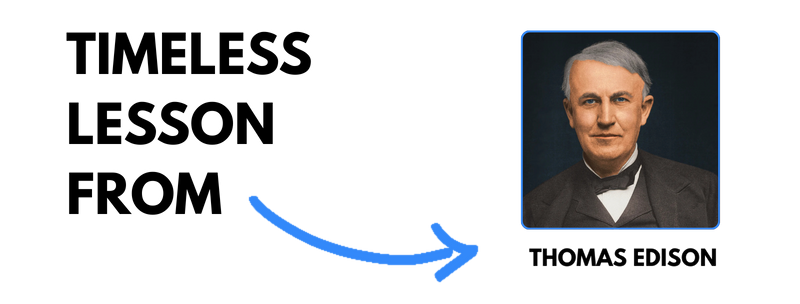Thomas Edison: Lighting the Modern World
The youngest of seven children, he was often sickly and performed poorly in traditional school.
Thomas Alva Edison was born on 11 February 1847 in Milan, Ohio. The youngest of seven children, he was often sickly and performed poorly in traditional school. His mother pulled him out and taught him at home, nurturing his curiosity. That curiosity, mixed with relentless persistence, would drive him to become one of the most famous inventors in history.
Before we continue, a quick word from today’s sponsor:
Cut Costs. Not Corners.
Economic pressure is rising, and doing more with less has become the new reality. But surviving a downturn isn’t about stretching yourself thinner; it’s about protecting what matters most.
BELAY matches leaders with fractional, cost-effective support — exceptional Executive Assistants, Accounting Professionals, and Marketing Assistants — tailored to your unique needs. When you’re buried in low-level tasks, you lose the focus, energy, and strategy it takes to lead through challenging times.
BELAY helps you stay ready for whatever comes next.
As a boy, Edison sold newspapers and candy on trains, using the money to fund his experiments. A childhood illness left him nearly deaf, but rather than discouraging him, it allowed him to focus deeply on his work.
In his teens, he worked as a telegraph operator, which exposed him to the power of electrical systems. By his early twenties, Edison was inventing full time. In 1876, he opened his research laboratory in Menlo Park, New Jersey, one of the first organized facilities dedicated to invention.
Over the next decades, Edison and his team developed groundbreaking technologies: the phonograph, the motion picture camera, and, most famously, the practical incandescent light bulb. By the time of his death, Edison held over 1,000 patents.
He was also a shrewd businessman, founding General Electric and creating industries around his inventions. But his career wasn’t without battles. He waged a fierce rivalry with Nikola Tesla and George Westinghouse over electrical systems, backing direct current (DC) while his competitors promoted alternating current (AC).
Edison’s drive and ability to commercialize inventions cemented his place as a titan of the modern age
Persistence Beats Brilliance
Edison is often remembered for his famous quote, “Genius is one percent inspiration and ninety-nine percent perspiration.” His own life proved it. He did not succeed because he always had the best ideas, but because he refused to stop testing them.
It reportedly took him more than a thousand attempts to perfect the light bulb. To most, that would look like failure. To Edison, it was simply the process of finding out what didn’t work until he discovered what did.
Edison’s life proves that perseverance beats raw talent. He failed hundreds of times before creating the light bulb, yet refused to call them failures — only steps toward success. His career shows that the line between futility and discovery is crossed by persistence. Genius shines brightest when fueled by relentless effort.
Until next time,
The Chronicler





